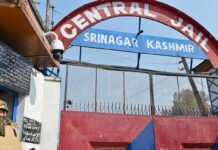Being first of its kind, a report on the alleged human rights violations in J&K, since the onset of militancy here, has indicted personnel, of all ranks, belonging to all the security agencies active on ground. Bilal Handoo presents an overview of what the report has to offer.
A report on the state of human rights in Kashmir, highlighting the grave human rights violations by security forces from 1989 to 2012 has been released in Srinagar. The 354 page report entitled ‘Alleged Perpetrators- Stories of Impunity in Jammu and Kashmir’ has been jointly prepared by International Peoples’ Tribunal on Human Rights and Justice in Indian administrative Kashmir (IPTK) and Association of Parents of Disappeared Persons (APDP).
The report has named some 500 personnel belonging to various security agencies, including those of J&K police, allegedly accused in 214 cases of human rights violations from 1989 onwards.
This report is the outcome of analysis and scrutiny of official state documents pertaining to the alleged cases of rights violations and in certain cases testimonies of the stake holders have also been taken into consideration.
“This violence and impunity has resulted in, by some estimates, enforced and involuntary disappearance of at least 8000 persons, besides more than 70,000 deaths and disclosures of at least 6000 unknown, unmarked and mass graves as of 2012,” reads the report.
The 500 security personnel named in the report include 235 Army personnel, 123 paramilitary personnel, 111 J&K Police personnel and 31 counter insurgents.
“Cases presented in this report reveal that there is a policy not to genuinely investigate or prosecute the armed forces for human rights violation. The designations of some of these alleged perpetrators points to a deep institutional involvement of the Indian state in the crimes,” said Kartik Murukutla, one of the authors and human rights lawyer
Among the officials alleged to be involved in rights violations are two Major Generals and three Brigadiers of the Indian Army, besides nine Colonels, three Lieutenant Colonels, 78 Majors and 25 Captains, besides, 37 senior officials of the federal Paramilitary forces, a recently retired Director General of the Jammu and Kashmir Police, as well as serving Inspector General.
“With this report, we point out how it is not possible to get justice under Indian justice system. The defining feature of human rights violations here is that, in the name of countering militant violence the Indian state authorizes armed forces to carry out every kind of operation, often without adherence to laws and norms,” noted human rights activist, said noted human rights activist Gautam Navlakha on the eve of its release.
Out of 235 Army personnel named in the report, 96 belong to Rashtriya Rifles and 139 other units of Army; out of the 123 paramilitary personnel 70 are BSF personnel, 34 belong to CRPF and 19 others. Among the named are 2 Addl Director Generals, 2 Dy Inspector General, 12 Commandant, 1 2nd In-command, 13 Dy Commandant and 7 Asst Commandant, besides 86 other ranks.
111 J&K Police officials include 1 Director General, 1 inspector General, 2 Dy Inspector Generals, 2 senior SPs, 3 SPs and 6 Dy SPs, besides 94 personnel of other ranks.
“What is striking is that the documents in possession of the state itself indict the armed forces and the police by providing reasonable, strong and convincing evidence on the role of the alleged perpetrators in specific crimes,” maintains the report.
This documented report also gives vital information on 124 extra-judicial killing, 65 enforced disappearance, 59 torture and 9 rapes allegedly committed by forces operated in state.
Districts like Baramulla, Kupwara and Srinagar have received more focused attention in this report, although the cases figuring in the report are from all over Jammu and Kashmir
“The official designations of the alleged perpetrators and the geographical spread of the crimes committed against the people of Jammu and Kashmir indicate a decisive will of the Indian state, carried out by its functionaries as part of a policy,” said Kartik.
Based on the findings of the report, IPTK and APDP has recommended that the international community must act expeditiously to recognize, highlight and question the Indian state on its direct role in human rights violations in Jammu and Kashmir.
















